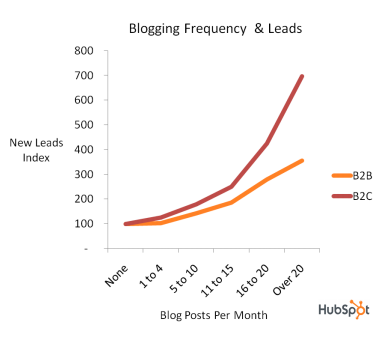3 Reasons Why Small Business Owners Should Blog
Writing and maintaining a company blog isn’t typically high on a small business owner’s to-do list. Yet despite the ongoing debate that rages about whether or not blogging (and especially corporate blogging) is dead, consistently creating blog content as a part of your business’ digital marketing strategy doesn’t only make sense from a content marketing standpoint—it can drive leads and sales, too.
Yet if you’re a blogging novice, diving in can seem downright intimidating. It’s not only a question of finding the time to consistently post, but to also seek compelling ideas that not only keep your readers engaged, but also help further your larger online marketing goals. Let’s dive in.
3 Reasons Small Business Owners Should Blog
Create a hub. Regardless of what social platforms you use, your website serves as the foundation of your business operations. Not Facebook. Not LinkedIn or Twitter and not a blog hosted on a free platform that’s not connected to your company website. When done correctly, your company blog is an extension of that hub.
Your website is where customers (and prospective customers) go to find information about your company, the services or products you sell and why (and how) they can hire or buy from you. Your blog gives customers and prospects a chance to see how you think, what you do, how you can serve and benefit them and allows them to see the voice of the company and get a glimpse into the corporate culture that your business, large or small, has. A blog can humanize your business, and today, that’s no small factor when it comes to business success. If you want to read more on that, we can’t recommend highly enough Maddie Grant’s new book, Humanize: How People Centric Organizations Succeed in a Social World.
- Feed Google. Surely if you’re reading the Planet Ocean blog, you’re well aware that when it comes to online marketing (or marketing of any kind), Google is your client. Sure, you also have a customer base. But keeping Google happy should be at the top of your priority list. And maintaining a company blog is a great way to accomplish this goal. When you blog, you regularly add fresh content to your site. This not only feeds the search engines but adds more indexable content to your site. More pages means more credibility in the eyes of The Google. And blog content that’s relevant, SEO optimized and strategically developed and designed to drive traffic to your blog impacts your appearance in search. Content marketing and SEO go hand in hand, and a blog is one of the absolute most effective tools to complement smart SEO.
- Leads. Blogging is for leads and sales. As mentioned above, blogging adds fresh content to your site, which means more pages of your site are indexed by Google. And more indexed pages means more leads. Hubspot’s Lead Generation Lessons from 4,000 businesses surveyed reported that businesses who blogged 16-20 times a month generated twice the traffic and three times the leads than businesses who blogged less than four times a month. Twice the traffic and three times the leads. Dudes, what more of an invitation do you need? Get yourselves focused on blogging!

- Something to share. Let’s say your business has a Facebook and a Twitter profile. And as you no doubt well know, the key to keeping your social profiles active is by sharing great content in those channels. If you don’t have a company blog, what content are you sharing (and linking to)? Outside sources? That’s not a bad move—except if it’s your only move. If you post nothing but content from external sources, then you’re continually driving customers away from your pages (and your website) and to other sites—sites that could, potentially, fulfill their needs instead of your business. Creating blog content gives you a ready supply of information to share with your audience—and as you attract a blog readership, those readers are more likely to share your content, too, which will exponentially increase your online reach. And after all—there’s strength in numbers, right? The wider you can cast a net, the more prospective customers you’ll attract—and that’s never a bad thing when it comes to business.
One final note of caution: don’t be egocentric in the blog content you create. Make your blog content a resource for your clients and prospects, entertain them, enlighten them, give them information they need, or that they can use in some way. Think, for instance, the value you get from reading the Planet Ocean blog and how you can apply it to your business and your life. That’s what you want to do with the blog content you create for your clients and prospects. Don’t sell, sell, sell from your blog – educate, entertain, enlighten. They’ll buy, you don’t have to hit them over the head with how great you are because that will drive them away just as quickly as it does when you act like “that guy” in real life.
Now that you have a clear picture of the benefits of blogging, you’re more likely to get started, right? Yet that’s the first step of the process. After all, a blog is nothing without content—and planning and creating that content can be the hardest part of the process. Stay tuned for our upcoming post on Content Creation Resources – it’ll help you generate ideas for blog content, organize them and track your blogging effectiveness.
Image via Mike Licht, NotionsCapital.com, via Creative Commons